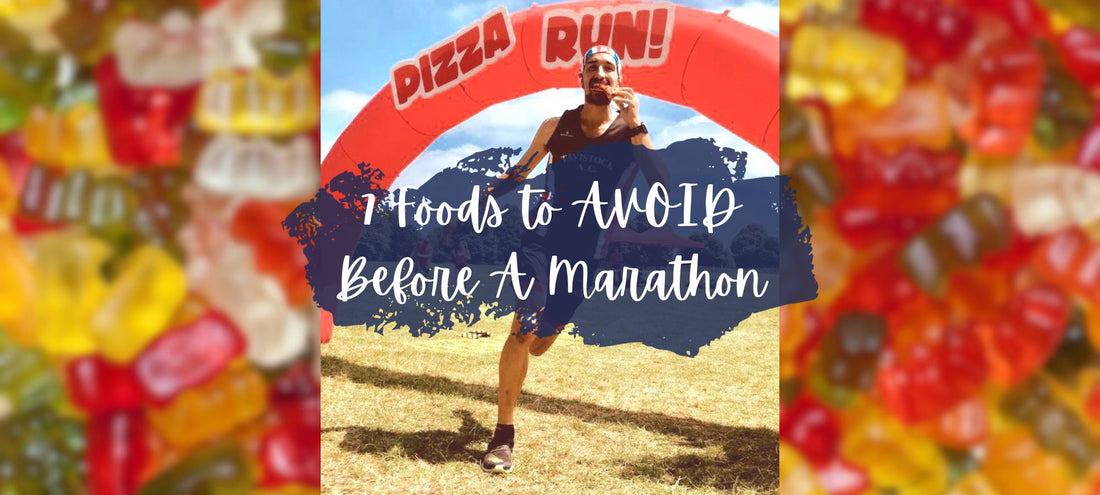
7 Foods To AVOID Before A Marathon
What could be worse than preparing and training for months for a marathon, only to eat the wrong thing on the day and ruin your performance. Disclaimer- we've all done it!

We asked Ultra Marathon runner and multiple Guinness World Record Holder (including one 'for the fastest male to run 10 marathons in 10 days') Adam ‘Tango’ Holland, what he doesn’t do in the lead up to the big day.

‘The first thing I would say is that what works for my body, won’t necessarily apply to the next person and that is a good tip to remember. Everyone is different. You will find that whilst researching not only nutrition, plans but training plans too.
You know your own body and what foods you find easy to digest or what exercises work best for you. Try out your own diet plan and draw upon other runners plans to find something unique for you.
Having said that, I have personally found out a few foods to avoid along the way and I am hoping your readers will find this information useful in the run up (pardon the pun) to a big race or a marathon. This will hopefully avoid any disastrous consequences on the big day.
As I have said before, these 7 foods to avoid are my own personal experience and what I find an issue may not cause you the same problems. Trial and error and experience is the only way to truly discover what foods your body works best with.'
Eggs
Protein takes longer for your body to digest- it is digested more slowly than carbohydrates and takes more energy to process. Eggs in particular, can sit in your stomach and may affect your performance.
I personally cannot eat eggs in any form in the 24 hours before a big event like a marathon, as they do not sit well in my stomach. I have seen fellow runners drop out of big races after they ate eggs for breakfast and later had tummy problems.
Pulses
Legumes such as lentils are a great source of fibre. However, eating high fibre foods before a run, can lead to bloating, gas and an impromptu toilet break. I don’t like pulses, so for me this is an easy one to avoid but anything that doesn’t digest easily is a bad idea.
Milk
Back to that protein again! Milk can leave you feel bloated and uncomfortable during a run and can sit heavily in your stomach too.
I think I also have a slight lactose intolerance to milk, as it can cause me to get cramps.
I know runners that will happily drink a coffee or tea with milk before a run.
For me I don’t drink much liquid before a run and if I do it will be water.
There are a lot of companies out there trying to sell you energy drinks and post recovery drinks but for me, water on the day and a post run chocolate milk -if I can get hold of one- are all I need.
Milk is a great recovery drink and helps your muscles to develop and heal after a race.
Refined sugars
Most people avoid sugar as this will lead to your blood sugar levels shooting up and then crashing, leaving you with less energy. Slow release energy is a better option like granola (I hate granola!).
However, for me I love sweets. As I run a fast marathon (my pace is around 10mph), I know my body will peak with sugar and keep me fueled throughout it.
As I can get a marathon done in around 2 hours 45 mins (for a 10 in 10) you will often see me at the aid stations hoovering up jelly beans and flat -not fizzy- Cola as I run around on a sugar high.
If you are taking a more steady pace, I'd suggest working out what foods will fuel you over the longer term such as bananas or oats.
Big meals
Eating a large meal or one with a lot of saturated fat before a run is a bad idea – think English Breakfast.
Your body will not have time to digest your food and you are likely to get cramps or feel uncomfortable. If you are looking for a personal best time then keep your meals light- this includes the night before.
Spicy food
Spicy food such as Chili can aggravate your stomach and is best avoided close to race day as it could lead to heartburn or an upset stomach. I keep my diet pretty plain with simple carbs as I near race day.
New foods
Avoid trying out new foods before a run. Eating something different may affect your digestion and lead to an upset stomach. For example, trying oysters or new types of seafood are not the best option the night before the big day.
I never try new foods in the lead up to a big race and I stick to the foods I know will move happily through my tummy and leave me feeling light and ready for acti
I hope this overview will be useful in your planning for the big marathon you have scheduled into your year. Remember, you know your body and you are unique, so follow a nutrition plan that suits your way of running.
Adam ‘Tango’ Holland is a Flanci Ambassador and the face behind our Trail Blazer range of men’s double layered shorts. If you can't catch him you can follow him on social media.


